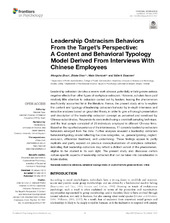| dc.contributor.author | Zhao, Mengchu | |
| dc.contributor.author | Chen, Zhixia | |
| dc.contributor.author | Glambek, Mats | |
| dc.contributor.author | Einarsen, Ståle | |
| dc.date.accessioned | 2020-05-07T07:27:43Z | |
| dc.date.available | 2020-05-07T07:27:43Z | |
| dc.date.issued | 2019-05-24 | |
| dc.Published | Zhao, Chen, Glambek M, Einarsen S. Leadership ostracism behaviors from the target's perspective: A content and behavioral typology model derived from interviews with Chinese employees. Frontiers in Psychology. 2019;10:1197 | eng |
| dc.identifier.issn | 1664-1078 | |
| dc.identifier.uri | https://hdl.handle.net/1956/22110 | |
| dc.description.abstract | Leadership ostracism denotes a severe work stressor, potentially entailing more serious negative effects than other types of workplace ostracism. However, scholars have paid relatively little attention to ostracism carried out by leaders, leaving the phenomenon insufficiently accounted for in the literature. Hence, the present study aims to explore the content and typology of leadership ostracism behavior by in-depth interviews and inductive analyses based on grounded theory, in order to give a thorough presentation and description of the leadership ostracism concept as perceived and construed by Chinese subordinates. Respondents were invited using a snowball sampling technique, and the final sample consisted of 26 individuals employed in different Chinese firms. Based on the reported experience of the interviewees, 11 concrete leadership ostracism behaviors emerged from the data. Further analyses revealed a leadership ostracism behavioral typology model reflecting five core categories, i.e., general ignoring, neglect, exclusion, differential treatment, and undermining. These findings appear to partly replicate and partly expand on previous conceptualizations of workplace ostracism, indicating that leadership ostracism may reflect a distinct variant of the phenomenon, eligible to be studied in its own right. The present study also discusses certain culture-specific aspects of leadership ostracism that can be taken into consideration in future studies. | en_US |
| dc.language.iso | eng | eng |
| dc.publisher | Frontiers | eng |
| dc.rights | Attribution CC BY | eng |
| dc.rights.uri | https://creativecommons.org/licenses/by/4.0 | eng |
| dc.title | Leadership ostracism behaviors from the target's perspective: A content and behavioral typology model derived from interviews with Chinese employees | eng |
| dc.type | Peer reviewed | |
| dc.type | Journal article | |
| dc.date.updated | 2019-11-25T07:53:04Z | |
| dc.description.version | publishedVersion | |
| dc.rights.holder | Copyright 2019 Zhao, Chen, Glambek and Einarsen | eng |
| dc.identifier.doi | https://doi.org/10.3389/fpsyg.2019.01197 | |
| dc.identifier.cristin | 1717992 | |
| dc.source.journal | Frontiers in Psychology | |

